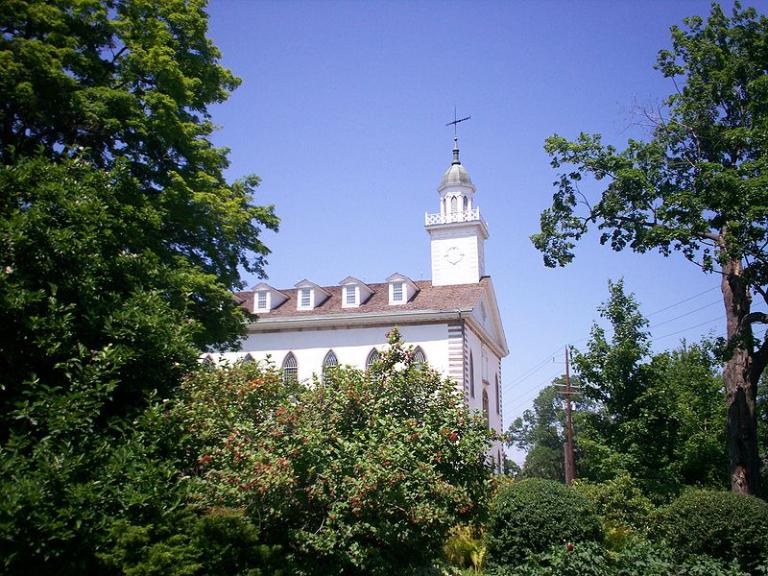
(Wikimedia Commons)
Four brief notes on our reading today in Alma 21:
1.
It’s not surprising, in 21:1-2, to learn that the Lamanites had built a significant city that they called Jerusalem. From the start, the founders of the Lamanite tradition, Laman and Lemuel, had objected to leaving Old World Jerusalem. They missed their familial wealth there and they rejected their father’s prophetic warning that the city was wicked and ripe for destruction (see 1 Nephi 2:11-13); on the contrary, they insisted that the people of Jerusalem (apparently including those who sought their father’s death) were a righteous people. (See 1 Nephi 17:22.) So we should probably see the founding in the New World of a major Lamanite city named Jerusalem as an expression of defiant rejection toward the prophetic claims of Lehi.
2.
We’re told essentially nothing about Ammah (21:11), except that he was a missionary companion to Aaron, one of the royal sons of Mosiah. (See Alma 20:2.)
3.
Alma 21:2 is the Book of Mormon’s first mention of a people called the Amalekites. We know little about them except that they were “dissenters” from among the Lamanites (Alma 43:13).
4.
One of the other things that we know about the Amalekites is that they were more hardened in their hearts, even, than were the Lamanites. (See, for example, 21:3, where they share that characteristic with the Amulonites, the descendants of the apostate priests of Noah.) Thus, at Alma 23:14 we’re told that, amidst an otherwise remarkably successful mission, only one Amalekite convert was made. And, at Alma 24:1 and Alma 43:6 and 43:44, the Amalekites stir the Lamanites up to fight against the Nephites when, frankly, the Lamanites would have preferred not to do so.
This is absolutely true to my own experience. The most bitter enemies of the Church of Jesus Christ are, by and large, those who have apostatized from it.
The Prophet Joseph Smith knew this, as well:
“Strange as it may appear at first thought, yet it is no less strange than true, that notwithstanding all the professed determination to live godly, apostates after turning from the faith of Christ, unless they have speedily repented, have sooner or later fallen into the snares of the wicked one, and have been left destitute of the Spirit of God, to manifest their wickedness in the eyes of multitudes. From apostates the faithful have received the severest persecutions. Judas was rebuked and immediately betrayed his Lord into the hands of His enemies, because Satan entered into him.
“There is a superior intelligence bestowed upon such as obey the Gospel with full purpose of heart, which, if sinned against, the apostate is left naked and destitute of the Spirit of God, and he is, in truth, nigh unto cursing, and his end is to be burned. When once that light which was in them is taken from them they become as much darkened as they were previously enlightened, and then, no marvel, if all their power should be enlisted against the truth, and they, Judas-like, seek the destruction of those who were their greatest benefactors.”
“From what source emanated the principle which has ever been manifested by apostates from the true Church to persecute with double diligence, and seek with double perseverance, to destroy those whom they once professed to love, with whom they once communed, and with whom they once covenanted to strive with every power in righteousness to obtain the rest of God?”
Daniel Tyler recalled this conversation between Isaac Behunin and Joseph Smith:
“When the Prophet had ended telling how he had been treated, Brother Behunin remarked: ‘If I should leave this Church I would not do as those men have done: I would go to some remote place where Mormonism had never been heard of, settle down, and no one would ever learn that I knew anything about it.’
“The great Seer immediately replied: ‘Brother Behunin, you don’t know what you would do. No doubt these men once thought as you do. Before you joined this Church you stood on neutral ground. When the gospel was preached, good and evil were set before you. You could choose either or neither. There were two opposite masters inviting you to serve them. When you joined this Church you enlisted to serve God. When you did that you left the neutral ground, and you never can get back on to it. Should you forsake the Master you enlisted to serve, it will be by the instigation of the evil one, and you will follow his dictation and be his servant.’”










